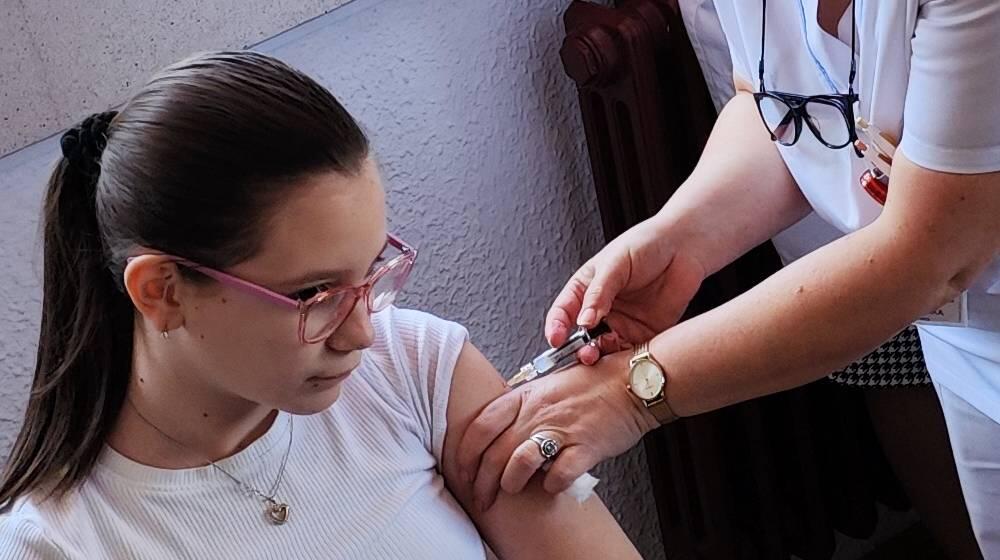"By vaccinating my daughters, I will preserve their health and reduce the possibility of transmission of the infection and enable them to live a better, more productive life.”
Sladjana Siljak, from Banja Luka, in north-western Bosnia and Herzegovina, is a mother to two daughters. She made sure her daughters got vaccinated against the human papillomavirus (HPV) that causes cervical cancer and contributed to spreading the word about the benefits of vaccination.
“I used the opportunity to get my children interested in talking about this with their peers in order to encourage them to protect themselves and ensure a healthier future.”
Cervical cancer is the second most common cause of cancer death among women in Eastern Europe and Central Asia. It primarily affects younger women, with the majority of cases occurring between 35 and 45 years of age. Every year, there are more than 38,000 new cases and 18,000 deaths from cervical cancer in the region - a rate up to 10 times higher than in Western Europe.
In Bosnia and Herzegovina, some 300 women and girls are diagnosed with cervical cancer every year. Screening programmes can reduce cervical cancer rates by up to 80 per cent (or by up to 90 per cent if combined with the human papillomavirus (HPV) vaccination of adolescent girls).
The International Conference on Population and Development Programme of Action recognizes the right to reproductive health as a critical element of guaranteeing reproductive rights. It broadly defines reproductive health as a state of complete physical, mental and social well-being and not merely the absence of disease or infirmity related to the reproductive system.
UNFPA in BiH’s efforts to prevent cervical cancer started more than a decade ago, in close collaboration with the relevant health authorities and other key stakeholders in the field.
To ensure these rights in Bosnia and Herzegovina, a cervical cancer prevention campaign was launched in December 2011 with a song entitled 'My Life is my Song' sung by four famous Western Balkan entertainers. The music formed the basis of a campaign where UNFPA and its partners highlighted the dangers of cervical cancer to women in Bosnia and Herzegovina and the Western Balkans and to provided information about how to prevent it.
The campaign included a concert, private donations through a phone bank, an art auction, roundtable of discussions and lectures. In addition, UNFPA BiH produced pamphlets explaining the importance of vaccination against HPV with the key message: “HPV is preventable – mission possible.” The campaign resulted in an uptake gynaecological visits and the Governments of the Federation of Bosnia and Herzegovina and the Republika Srpska expressed an interest in developing a prevention programme.

As a result, UNFPA advocated for the implementation of a comprehensive cervical cancer prevention programme and, at the beginning of 2021, the HPV vaccination programme got underway in Sarajevo Canton. The programme was subsequently extended to the Federation of Bosnia and Herzegovina and the Republika Srpska. Today, there are three HPV vaccination programmes in the country aimed at vaccinating all teenage girls (and boys in Republika Srpska) and today, some 4200 young people had already been vaccinated.
“This is a great achievement for Bosnia and Herzegovina,” said a health worker from Gracanica, in North-Eastern Bosnia and Herzegovina. “This is something I've waited for, for a long time, and finally it came true!”
Together with all levels of governments in Bosnia and Herzegovina, UNFPA plans to undertake a survey during 2024 aimed at identifying gaps and needs in healthcare systems across the country to develop a comprehensive cervical cancer prevention programme.
“We will not stop there,” said John Kennedy Mosoti, UNFPA Representative for Bosnia and Herzegovina. “UNFPA is determined to launch a comprehensive cervical cancer prevention programme together with the health authorities in Bosnia and Herzegovina, which includes the implementation of organized screening.”
Updated on 20th September 2024:
Brcko District has officially joined the HPV vaccination programme. Vaccination will begin on 23 September 2024, in cooperation with the Public Health Centre Brčko. The nine-valent HPV vaccine is available, and free vaccination is provided for boys and girls aged 9 to 14. Adolescents aged 15 and 16 can also receive the vaccine for free, while those older than 16 require a specialist’s recommendation. This initiative marks another significant step in the prevention of cervical cancer in Bosnia and Herzegovina.


